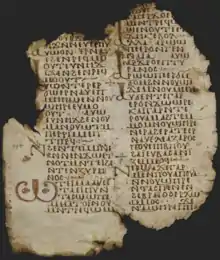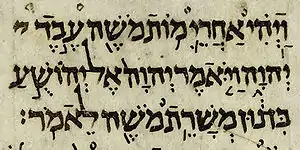4 Maccabees
The Fourth Book of Maccabees, also called 4 Maccabees or IV Maccabees, is a homily or philosophic discourse praising the supremacy of pious reason over passion. It was written in Koine Greek in the first or second century CE.

 | |||||
| Tanakh (Judaism) | |||||
|---|---|---|---|---|---|
|
|
|||||
| Old Testament (Christianity) | |||||
|
|
|||||
| Bible portal | |||||
Canonicity
It is not in the Bible for most churches, but is an appendix to the Greek Bible, and in the canon of the Georgian Orthodox Church. It was included in the 1688 Romanian Orthodox and the 18th-century Romanian Catholic Bibles where it was called "Iosip" (Joseph). It is no longer printed in Romanian Bibles today.
Synopsis
The work consists of a prologue and two main sections. The first advances the philosophical thesis while the second illustrates the points made using examples drawn from 2 Maccabees (principally, the martyrdom of Eleazer and the Maccabean youths) under Antiochus IV Epiphanes. The last chapters concern the author's impressions drawn from these martyrdoms. The work thus appears to be an independent composition to 1 Maccabees and 2 Maccabees, merely drawing on their descriptions to support its thesis. It was composed, in the words of Stephen Westerholm of the Eastern-Greek Orthodox Bible, "very fluently... and in a highly rhetorical and affected Greek style." Harry Orlinsky describes it as "an elaborate variation, in philosophical and highly dramatic vein, of the theme" of 2 Maccabees 6:18–7:4.[1]
Authorship and criticism
According to some scholars, the last chapter shows signs of later addition to the work, though this was disputed by the 19th-century authors of the Jewish Encyclopedia. The dispute is based on the weak ending the book would have without the "added" chapter, as well as arguments based on style. The change of direction with chapter 17 supports the view of the work as a homily held before a Greek-speaking audience on the feast of Hanukkah, as advanced by Ewald and Freudenthal, where this would be a rhetorical element to draw the listeners into the discourse. Others hold that a homily would have to be based on scriptural texts, which this work is only loosely.
In style, the book is oratorical, but not so much as 3 Maccabees. What can be interpreted as Stoic philosophy is cited by the author, though there is little original philosophical insight in the text. Although its Hellenistic Jewish nature assumes an origin in Alexandria, its interest in martyrs in Antioch and its similarity to writings in modern Turkey point to an origin in the northeast Mediterranean. Regarded as Jewish literature, it is cited as the best example of syncretism between Jewish and Hellenistic thought.
The book is ascribed to Josephus by Eusebius and Jerome,[2] and this opinion was accepted for many years, leading to its inclusion in many editions of Josephus' works. Scholars have however pointed to perceived differences of language and style. The book is generally dated between 20 and 130 CE, likely in the later half of that range.
Doctrinal content
The writer believes in the immortality of the soul, but never mentions the resurrection of the dead.[3] Good souls are said to live forever in happiness with the patriarchs and God, but even the evil souls are held to be immortal. The suffering and martyrdom of the Maccabees is seen by the author to be vicarious for the Jewish nation, and the author portrays martyrdom in general as bringing atonement for the past sins of the Jews.[4]
Manuscripts and translations
There are over 70 extant Greek manuscripts of 4 Maccabees. A complete Syriac translation also survives, as does a Latin reworking under the title Passio Sanctorum Machabaeorum (Suffering of the Holy Maccabees).[5] The Latin text was made around the same time as Ambrose's De Jacob et vita beata (388), which includes an independent partialy translation of 4 Maccabees. It was probably completed before the appearance of the Vulgate in 405–406. It was probably produced in Gaul.[1]
In the 1980s, Enzo Lucchesi discovered fragments of an abridged Sahidic Coptic translation, which have been edited and translated into English. Maximus the Greek produced an abridged Slavonic translation.[6]
References
- Harry M. Orlinsky, "Review of Heinrich Dörrie, Passio SS. Machabaeorum, die antike lateinische Übersetzung des IV. Makkabäerbuches", Journal of Biblical Literature 60, 4 (1941):. 440–445. JSTOR 3262470
- "The Books of the Maccabees" by John R Bartlett, The Oxford Companion to the Bible, ed. by Bruce M. Metzger and Michael D. Coogan, (Oxford University Press, 1993, ISBN 0-19-504645-5) p.482
- The Access Bible (Oxford University Press, 1999), Apocrypha 330.
- History of opinions on the scriptural doctrine of retribution, Edward Beecher, D. Appleton & Company, 1878 (original), Tentmaker publications, 2000, ISBN 0-548-23111-7.
- Robert J. V. Hiebert, "Preparing a Critical Edition of IV Maccabees: The Syriac Translation and the Passio Sanctorum Machabaeorum as Witnesses to the Original Greek", in F. García Martínez and M. Vervenne (eds.), Interpreting Translation: Studies on the LXX and Ezekiel in Honour of Johan Lust (Peeters, 2005), pp. 193–216.
- Ivan Miroshnikov, "The Sahidic Coptic Version of 4 Maccabees", Vetus Testamentum 64 (2014): 69–92.
External links
- Greek text from Septuaginta: Id est Vetus Testamentum graece iuxta LXX interpretes (Stuttgart: Privilegierte württembergische Biblelanstalt, 1935), via The Online Pseudepigrapha.
- English text from The Apocrypha, New Revised Standard Version (NRSV)
- English text from The Apocrypha, Revised Standard Version (RSV)
 "IV Maccabees". The Jewish Encyclopedia. 8. 1904. pp. 239–243.
"IV Maccabees". The Jewish Encyclopedia. 8. 1904. pp. 239–243.- . Encyclopædia Britannica. 17 (11th ed.). 1911.
- Swete, Henry Barclay (1914). "Books not included in the Hebrew canon". An introduction to the Old Testament in Greek. Cambridge University Press. p. 280.
- New Testament Allusions to Apocrypha and Pseudepigrapha (including 4 Macc.)
- New English Translation of the Septuagint (4 Maccabees)
4 Maccabees | ||
| Preceded by 3 Maccabees |
E. Orthodox Books of the Bible |
Succeeded by Job |